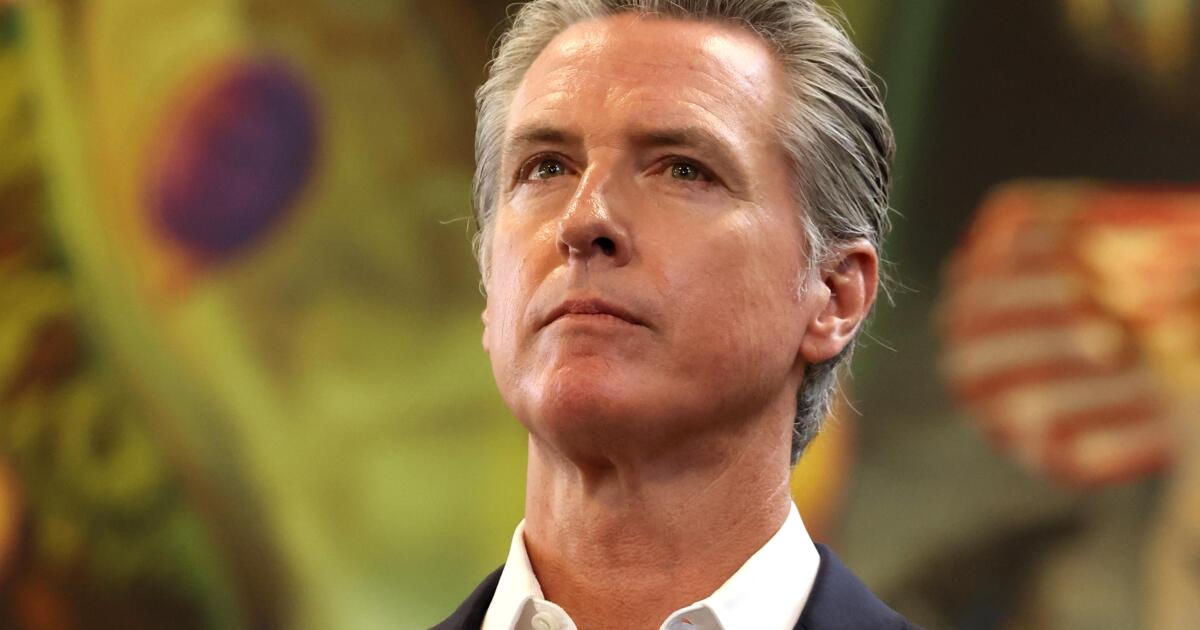Newsom signs bill to open up some police files for watchdogs
Gov. Gavin Newsom signed a bill Monday that will allow police oversight officials investigating misconduct to access confidential law enforcement personnel records, a change that watchdogs have argued will increase accountability for officers who break the rules.
Los Angeles County advocates and members of the county’s Sheriff Civilian Oversight Commission pushed for months in support of AB 847. The legislation comes in response to what proponents have described as efforts by the sheriff’s departments in L.A. and other counties to stymie access to sensitive records.
When it takes effect on Jan. 1, the new law will “grant access to the confidential personnel records of peace officers and custodial officers … to civilian law enforcement oversight boards or commissions during investigations” into officers’ conduct, according to the bill’s legislative summary.
Hans Johnson, the chair of L.A. County’s Civilian Oversight Commission, said it’s a much-needed change.
“I’m pleased because this has been a long road,” he said in a phone call Monday night. “Tonight is a moment of vindication.”
The Sheriff’s Department wrote in a statement that “the passage of AB 847 provides clarity to a long-standing legal issue that has been the subject of contention between the Department and its Civilian Oversight Commission (COC) since its inception.” It added that the “Department will work with County Counsel, labor representatives, and the COC on the implementation of this new law.”
Some law enforcement unions and advocacy groups criticized the law.
Lt. Steve Johnson, president of the L.A. County Professional Peace Officers Assn., said in an email that his organization “fully understand[s] the intent to enhance civilian oversight,” but when “access to confidential records isn’t safeguarded with precision and responsibility, it opens the door to real dangers. Transparency must never come at the cost of personal safety or public trust.”
Newsom’s office did not immediately provide a comment Monday.
Johnson said the bill’s signing is an especially meaningful victory for the families of people such as Joseph Perez and Emmett Brock, who were beaten by L.A. County sheriff’s deputies in 2020 and 2023, respectively. He also cited the case of Andres Guardado, who was shot to death by deputies in 2023, “and others who were the subjects of efforts by our commission to get records disclosed to us under subpoena about sheriff deputies’ encounters and beatings.”
In a phone call Monday night, Vanessa Perez, Joseph’s mother, called the law’s signing a “big victory not just for Joseph, but for all families impacted by the Sheriff’s Department.”
Perez said she expects the new law will allow the Civilian Oversight Commission to review previously off-limits records about the deputies who beat her son and redacted portions of other documents.
She and other members of the general public will not be able to access the records, as the law requires “oversight boards to maintain the confidentiality of those records, and would authorize them to conduct closed sessions, as specified, to review confidential records,” according to its legislative summary.
Still, Perez is hopeful her son’s case will benefit from the additional disclosure now allowable under AB 847.
Robert Bonner, a former federal judge and former chair of L.A. County’s Civilian Oversight Commission who has said he was abruptly removed from that post earlier this year, praised the bill’s signing in an email Tuesday.
The law “will be essential to holding accountable those who use excessive force against members of the public,” Bonner wrote. “This is a big deal. This is a quantum leap forward for civilian oversight commissions.”

